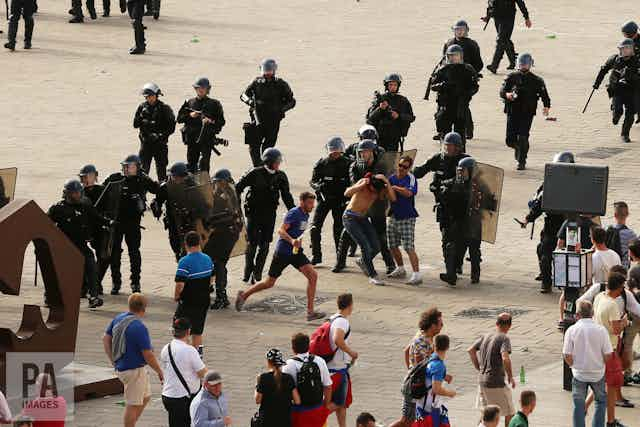When it comes to sport, fans are scrutinised almost as much as as the highly paid stars they are going to watch. Unfortunately for Russia, it is not only the country’s political leaders who have been attracting bad headlines in the West. Sporting stars and fans alike have been giving the nation a bad name which is why a good World Cup is vital.
The fact is, fans create a lasting impression at international events. At the Pyeongchang 2018 Winter Olympics, it was a group of North Korean fans who attracted the attention of the international media. Their highly choreographed chants, movement and dress was meant to impress other supporters and affect the athletes. But, instead, it provided a poignant insight into the nature of North Korea’s totalitarian society.
On the opposite end of the spectrum were Iceland’s football fans at the 2016 UEFA European Football Championship in France. The colourful support of Icelanders cheering on their team with the now iconic “Viking Thunder Clap” was also highly coordinated, but produced a different effect. It has been borrowed by fans from different countries and different sports and even introduced in the popular football videogame FIFA 18, becoming Iceland’s cultural export.
The image of genuine national unity around their team’s unexpected success in 2016 was emphasised by reports that nearly 10% of the country’s population went to the competition to support their team. Iceland’s then newly-elected president, Guðni Th. Jóhannesson, stood shoulder-to-shoulder with common fans in the stands when Iceland achieved its most famous football victory at the expense of England. It is hard to imagine a more positive nation branding exercise.
Russian hooliganism
Fans from Russia also made international news at the same tournament but for the wrong reasons. Prior to and during the England-Russia match in Marseille, a well-organised group of Russian hooligans attacked English supporters. Their self-proclaimed goal was to capture the status of “hooligan culture capital” away from England. The initial response from Russian authorities ranged from passive mockery at the expense of English fans to blaming the tournament organisers for failing to ensure security.
This gave a sense to Western observers that Russian hooligans’ aggression against other European fans was not just passively overlooked but rather encouraged by the Russian authorities – even if this was not the case. In the years since, the Kremlin took significant steps to clamp down on Russian hooligan organisations and the Russian football authorities have attempted to present a more favourable image of their local fans to the world.
The so-called “Gentlefan: Russian Warm Welcome” programme centred on making international fans attending games against Russian football clubs feel safe and welcome by giving them gifts. On the surface, the campaign worked well. Some commentators described the campaign as a “stunning fan-led victory” for Russia.
But the campaign would only have an effect on those fans who travelled to Russia recently or closely followed their club’s trip, as its international visibility was nowhere near close to the bad press Russian hooligans received at Euro 2016.
Politics and scandals
In the realm of politics, a soft approach by political elites to persuade international sporting officials to bring large-scale sporting events to Russia paid off. Vladimir Putin made his first ever public English-language speech in support of Sochi’s bid to host the 2014 Winter Olympics – a gesture interpreted as an important factor in securing the Games for Russia.
Similarly, Russia’s former sports minister Vitaly Mutko famously played a joke about having difficulty delivering his speech in English while trying to persuade FIFA officials to grant Russia the rights to host the 2018 World Cup. Personal commitment to these events and the lighter tone used by the political figures in these instances gave a signal that Russia is internationally oriented and open to host the world through these events.

But the ongoing doping scandal around Russian sports continues to do damage. It culminated with a ban on Russia’s participation in the 2018 Winter Olympics under its own flag and had been preceded by the doping controversy surrounding Russia’s most internationally recognisable athlete and celebrity, Maria Sharapova.
Her case was not at all related to the ongoing legal battle over Russia’s alleged state-sponsored doping programme at the Sochi Games. But while Sharapova’s ban from competition was cut short (she has since returned to competing professionally) she has yet to achieve a level of success comparable to the early stages of her career. The reputational damage to one of contemporary Russia’s greatest athletes – and the Russian sports system by association – has been done.
Russia has no globally recognised football stars and the national team is not expected to impress at the home World Cup. One of Russia’s most famous football-related personas in the West, Roman Abramovich, reportedly ran into trouble extending his UK visa, preventing him from attending the recent FA Cup final won by his club, Chelsea FC. All of these narratives around Russia’s sports stars fit in closely with those stories playing out on the political stage – rather than breaking away from them by painting a positive image of the country through sporting achievements.
The main problem for Russia is that the reputational damage caused by hooligans and doping scandals is hard to erase. Simple PR campaigns like Gentlefan are not enough. The real test of Russian fans’ hospitality will come at the World Cup when hundreds of thousands of international guests will come to meet Russians and experience for themselves the land they hear so much about in the media. It will be up to the Russian people to showcase an image of Russia which is different from that which is painted in the West.
More evidence-based articles about the politics of football, written by academics:

